Three apartment fires with one common factor.
In 2009, a fire started in the lobby of Greenacre Apartments, a four-storey apartment building near Burnaby Hospital.
Residents tried to get out the front door, but flames blocked the way. Stumbling though smoke, parents were separated from their children. A group of teenagers leapt from a window to escape the heat and smoke.
Sixty-year-old Sudeshna Nath died of a heart attack after trying to flee. Her 19-year-old son Ravi ended up in hospital in critical condition, his face wrapped in bandages.
And eight-year-old Joshua Peng was fighting for his life in BC Children’s Hospital, with burns to nearly half of his body.
Four years later, the building burned again. No one died or was seriously injured. But this time it was destroyed and 100 tenants lost their homes.
In July 2023, another fire, this time at a three-storey apartment building in Vancouver’s Mount Pleasant neighbourhood. Around 70 tenants lost their affordable housing and most of their belongings, and three had to be rescued from their balconies — including a woman who was seven months pregnant. The building was left uninhabitable.
What do all these fires have in common?
The properties were — and still are — owned by Fu De (Henry) Ren and his wife, Fang Yan. And while the Mount Pleasant fire was determined to be accidental, the buildings and their owners had a record of multiple fire safety violations.
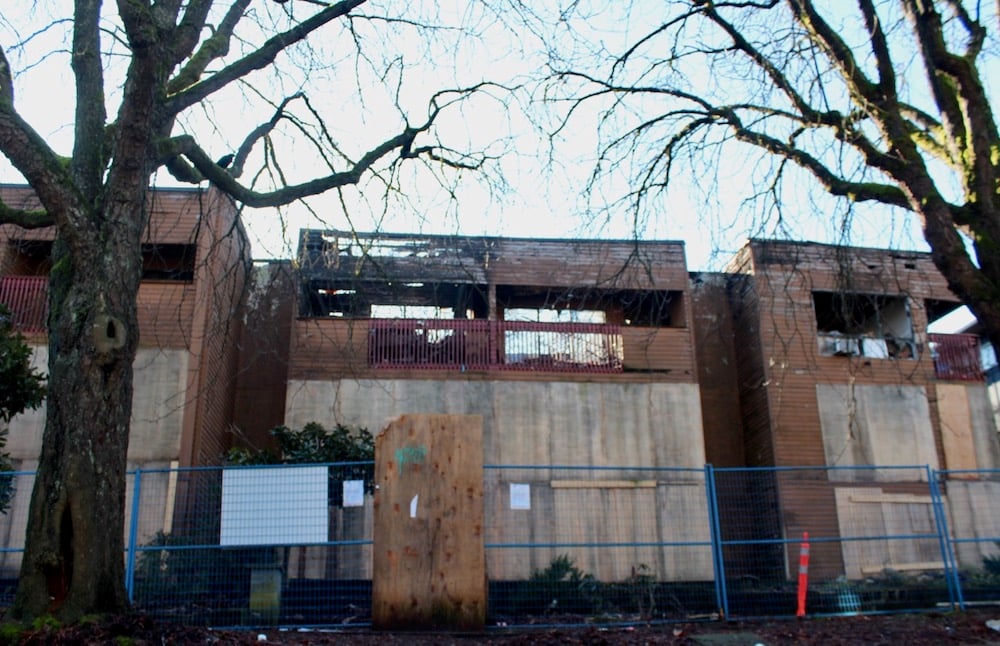
Almost six months after the fire at 414 E. 10th, some residents are still couch-surfing because they haven’t been able to find a new place. One couple Vancouver Coun. Pete Fry knows is living in a camper van.
“I want justice for tenants,” Fry said. “I don't want to a catastrophe like this to happen again.”
Fry added that it’s clear more action is needed to keep tenants safe throughout the city.
The Tyee has examined the history of fire and bylaw enforcement at Ren and Yan’s properties. Our deep dive provides a look at the tools available to municipalities to compel landlords to comply with regulations that are supposed to keep residents safe — and where those tools are falling short.
A horrific fire left a mother dead and a child disabled
The horror of the March 2, 2009, fire is laid bare in a civil court case that was filed by the Peng family. According to documents filed in 2011, when Joshua Peng was 10, he was left with burns to 45 per cent of his body, injuries from smoke inhalation, seizures, scarring and post-traumatic stress disorder. A skin graft had failed and he’d battled infections. He continued to live with pain, and was permanently disabled. The court ordered Ren and Yan to pay damages of $2.7 million to Peng.
The Nath family also sued Ren and Yan, as well as the City of Burnaby and Gunn Fire Prevention. Sudeshna Nath’s husband and two adult sons sought damages for the “loss of guidance and companionship of their wife and mother.” Court documents do not include details of a settlement agreement.
Media reports from 2009 say Sudeshna’s son Ravi risked his own life trying to get Joshua Peng out of the burning building.
The Tyee was not able to find contact information for the Peng family and has relied on information from news media reports and court documents. A member of the Nath family spoke to The Tyee but declined to comment.
Burnaby Fire Department reports obtained through a freedom of information request show that firefighters attended Greenacre Apartments once in 2008 for a complaint about a broken elevator. The complainant, whose identity is redacted for privacy, said they were afraid of not being able to escape in case of fire.
Documents from 2012 show firefighters were visiting much more frequently, often inspecting Greenacre once or twice a month throughout that year and constantly writing orders to fix fire safety problems in the building.
Inspection reports obtained through a freedom of information request show fire inspectors were finding problems with just about every fire protection system at Greenacre, including smoke alarms, the building alarm, the fire safety plan for the building, extinguishers, emergency lights, clutter that could block exits and holes in walls that could let a fire spread quickly.
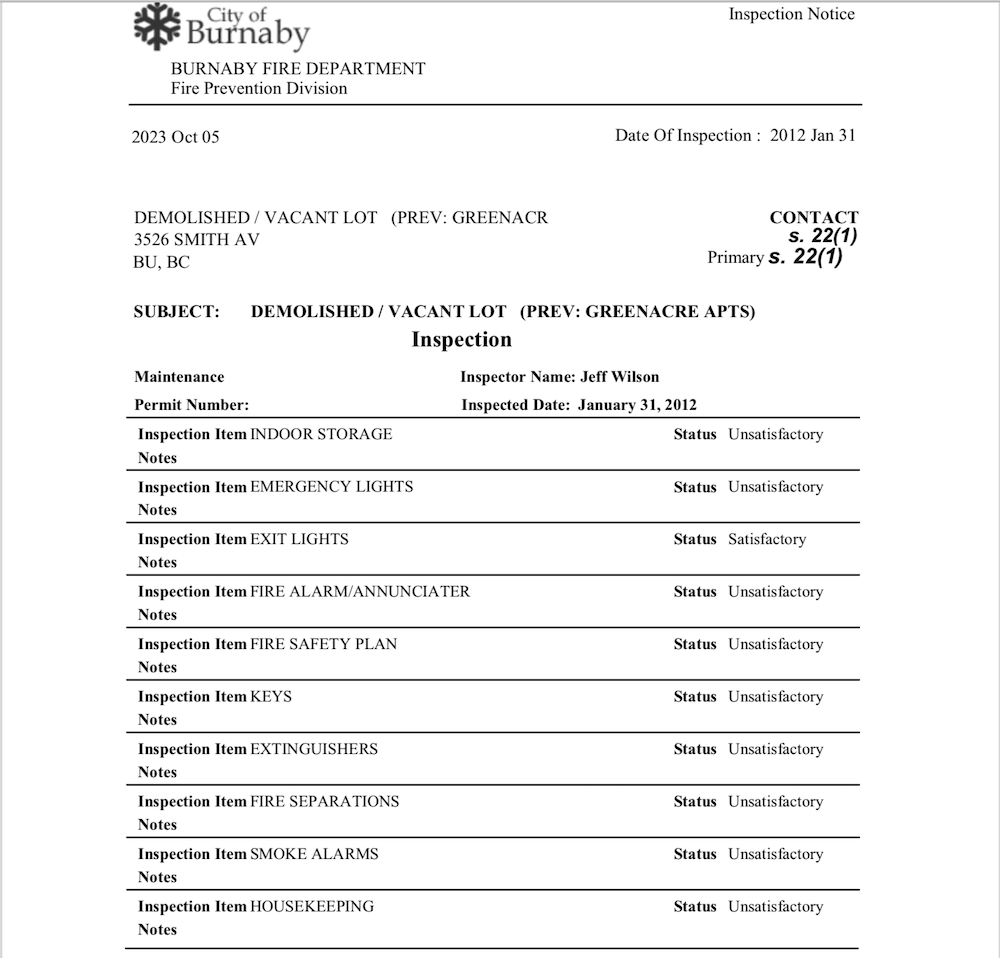
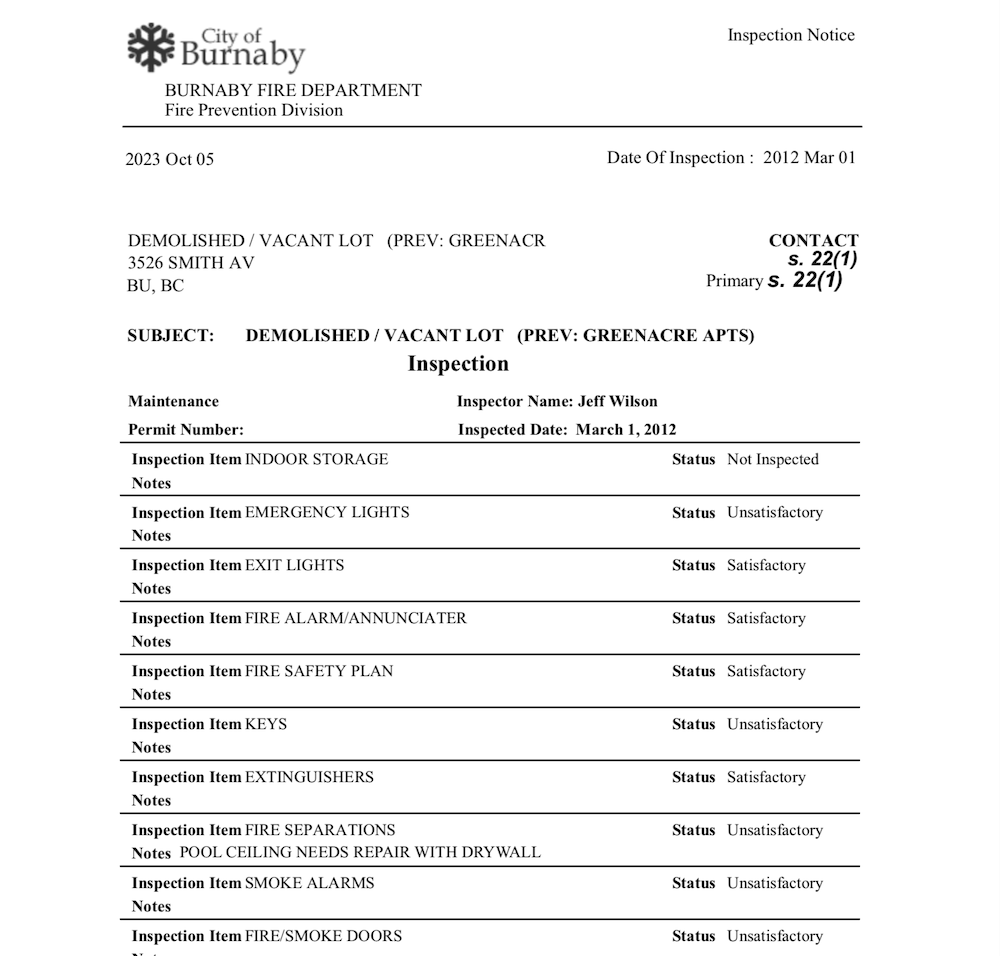
Finally, after 13 “unsatisfactory” visits in 2012, firefighters marked an Oct. 11 inspection as “satisfactory.” Just four months later, on Feb. 17, 2013, the building was destroyed by a fire. This time, no lives were lost.
The Tyee obtained fire reports on the 2009 and 2013 fires from the Office of the Fire Commissioner, which show the causes of the two fires were both undetermined. The Tyee asked the City of Burnaby whether Mayor Mike Hurley would like to comment for this story but did not receive a response.
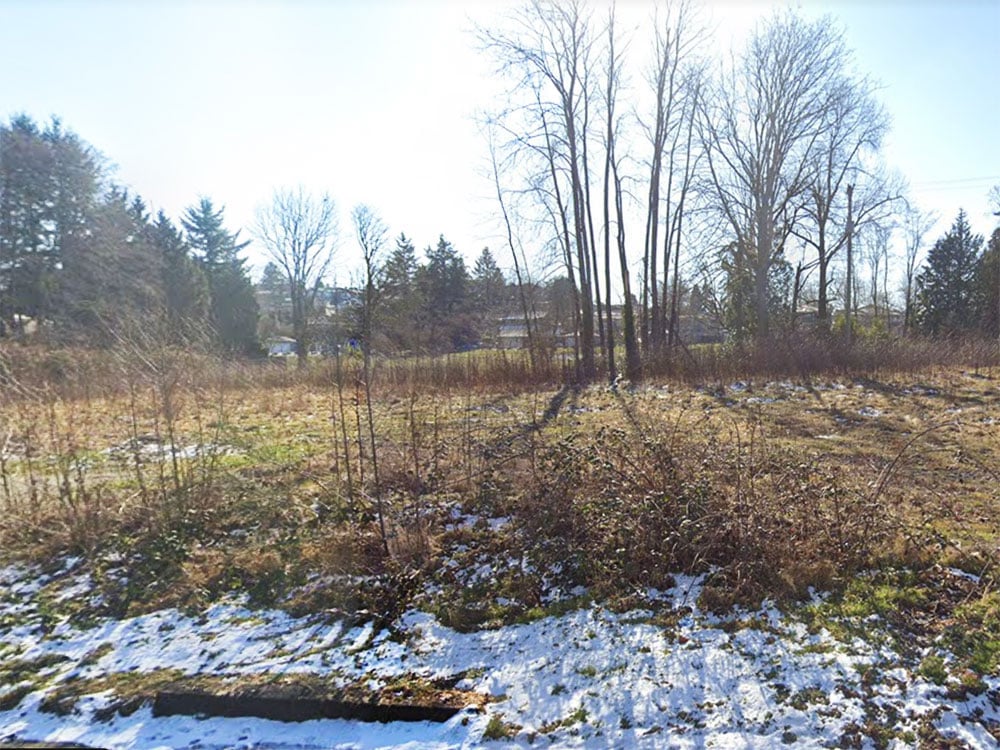
‘Are you attempting to portray me as a very bad landlord?’
Ren and Yan’s names appear on mortgage documents for Greenacre Apartments in 2006 and on mortgage documents for 414 E. 10 Ave. in 2005.
Despite finding multiple fire safety violations, the City of Burnaby never took Ren and Yan to court.
But the City of Vancouver did, over problems at the Mount Pleasant apartment.
Court filings show Ren was fined $750 in 2017 after the City of Vancouver charged him with a fire code violation for allowing combustible materials to accumulate.
In 2020, Ren was charged with five more fire code violations after an inspection of 414 E. 10th Ave. Ren was fined $13,000 after being found guilty of those violations in 2021 and was issued a one-year order to make sure his building remained in compliance with the fire code.
That one-year order expired on Nov. 8, 2022. On Nov. 17, just nine days later, fire inspectors visited the building again. They found a number of violations and Ren was charged with 20 more bylaw infractions in provincial court.
Before those charges could be heard, a fire started in a third-floor suite on July 27, 2023. Fire investigators found it began when a tenant with hoarding problems left a candle unattended.
Despite the repeated orders he’d faced in his years as a landlord, at a Feb. 9 bylaw trial Ren insisted the fire department had erred when serving him with notices. Ren also told the judge he had housed 30 homeless people in the apartment building. (Tenants have told The Tyee that the building housed a mix of working people and people who received social assistance.)
Finally, Ren agreed to plead guilty to six out of the 20 bylaw violation charges and pay $4,500 in fines.
Judicial Justice Zahid Mahkdoom presided over both the 2021 trial and the 2024 trial.
On Feb. 9, Mahkdoom said that if Ren had complied with his 2021 order “the likelihood is that the building wouldn’t have burned down.”
“What makes this so difficult and what makes it so egregious is the nonchalant nature of Mr. Ren’s approach towards this building and its residents,” Mahkdoom said.
In 2021, Ren and Yan were charged under a process that allows for much higher fines. But for the charges heard at the 2024 trial, the city chose to charge the landlords with multiple bylaw violations where fines are capped at $750 for each offence. Ren was fined $750 for each of the six charges he pled guilty to, though Mahkdoom said he would have preferred to fine Ren $5,000 to $10,000 on each count.
Ren told the judge his finances were poor following the fire. But he continues to own several properties: the site of the destroyed Greenacre Apartments building at 3526 Smith Ave. in Burnaby, now a vacant lot; the fire-damaged 414 E. 10th Ave. in Vancouver; a six-bedroom house in Vancouver; and a farm property in Delta. The combined value of those real estate holdings is $24 million, according to BC Assessment. The Tyee used land titles and the Land Ownership Transparency Registry to find information about Ren’s properties.
Ren and Yan still have another bylaw violation trial to attend, this one dealing with three orders the city handed down after the 2023 fire, when the building had been left open to the elements and squatters were frequently breaking in. In the weeks after the fire, the fire department had to respond three times to put out more fires.
Fry says he was shocked to hear the city had recouped just $4,500 in fines and told The Tyee he’s asked city manager Paul Mochrie for an explanation.
“I think we have one serious job in our in our portfolio, and that's protecting the life and property of folks through our bylaws,” Fry said. “And I just don't feel like we're doing that as well as we could.”
Following the Feb. 9 bylaw trial, The Tyee asked Ren if he could answer questions about the previous fires at his buildings and the residents who had died or been injured in the 2009 fire.
He declined. Ren had previously told The Tyee the fires were accidental and caused him great distress. He blamed the Burnaby and Vancouver fire departments for not responding quickly enough.
The Tyee also asked Ren whether he planned to demolish 414 E. 10th Ave and whether he plans to become a landlord again. He did not answer those questions, but he did respond to a question about whether he had refused to provide a copy of a tenant’s lease after the fire.
“What exactly are you trying to prove? Are you attempting to portray me as a very bad landlord? If I were, why would I accommodate 30 homeless individuals in my building?” he wrote in a text.
Can Henry Ren become a landlord again?
Fry says he wants to know whether Ren could become a landlord again, renting apartments to people who are desperate to find housing in one of the most competitive and expensive rental markets in North America.
According to city staff, the city has not issued an order to demolish 414 E. 10th Ave. because it could be repaired. But city councillors can decline a new rental property licence to Ren and Yan.
“If the applicant has been convicted of any offence under any Statute of Canada, the Province of British Columbia or elsewhere, or under any bylaw of the City of Vancouver, and the nature of the offence relates to the business, trade, profession or other occupation under which the application has been made, then a refusal can be made,” city staff explained by email.
“If the Chief Licence Inspector refuses to issue the licence, the applicant may choose to present their case to Council.”
Ren and Yan might also have trouble getting insured. During the Feb. 9 bylaw trial, Ren told the court that 414 E. 10th Ave. is not insured “because of the fire.”
Rob de Pruis, the national director of consumer and industry relations for the Insurance Bureau of Canada, said most landlords would not take the risk of operating a rental building without insurance, and not having insurance could also affect any mortgage on the property.
Insurance companies do look at the history of building owners, said de Pruis, and a history of frequent fires, claims and bylaw infractions could lead to higher premiums or the insurer declining to provide coverage.
De Pruis said it’s “physically possible” for a building owner who owns a property without a mortgage to operate without insurance, although the financial risk would be very high. The land title for 414 E. 10th Ave. shows the building continues to have a mortgage from Vancity Credit Union.
“Many people would choose not to operate and make the business decision to sell the property,” de Pruis said.
In extreme cases, the city can expropriate a property if it is left in disrepair. But Vancouver has only used that power once before, when it expropriated the Balmoral and Regent hotels, both owned by the notorious Sahota family. The process took years, and the city ended up paying $11.5 million to buy the two properties.
City staff often try to work with landlords as much as possible because of the risk of losing affordable housing stock if the buildings are shut down. But that can lead to situations where tenants are being housed but living in horrific conditions.
Fry said he’d like to see the province explore the creation of a mandatory landlord registry system. While the landlord advocacy group Landlord BC operates a registry for landlords, it’s voluntary, and simply shows whether property owners have taken a course that shows they understand B.C.’s Residential Tenancy Act.
In Halifax, Nova Scotia, city council recently passed a registry bylaw that requires property owners to provide their contact information, information about the property management operator, a description of the property, proof of insurance and a maintenance plan.
According to a Halifax city staff report, the purpose of the registry is to provide a “comprehensive list” of rentals, “which will provide a basis for pro-active inspections to ensure all rental units are held to the same minimum occupancy and building and fire safety standards.”
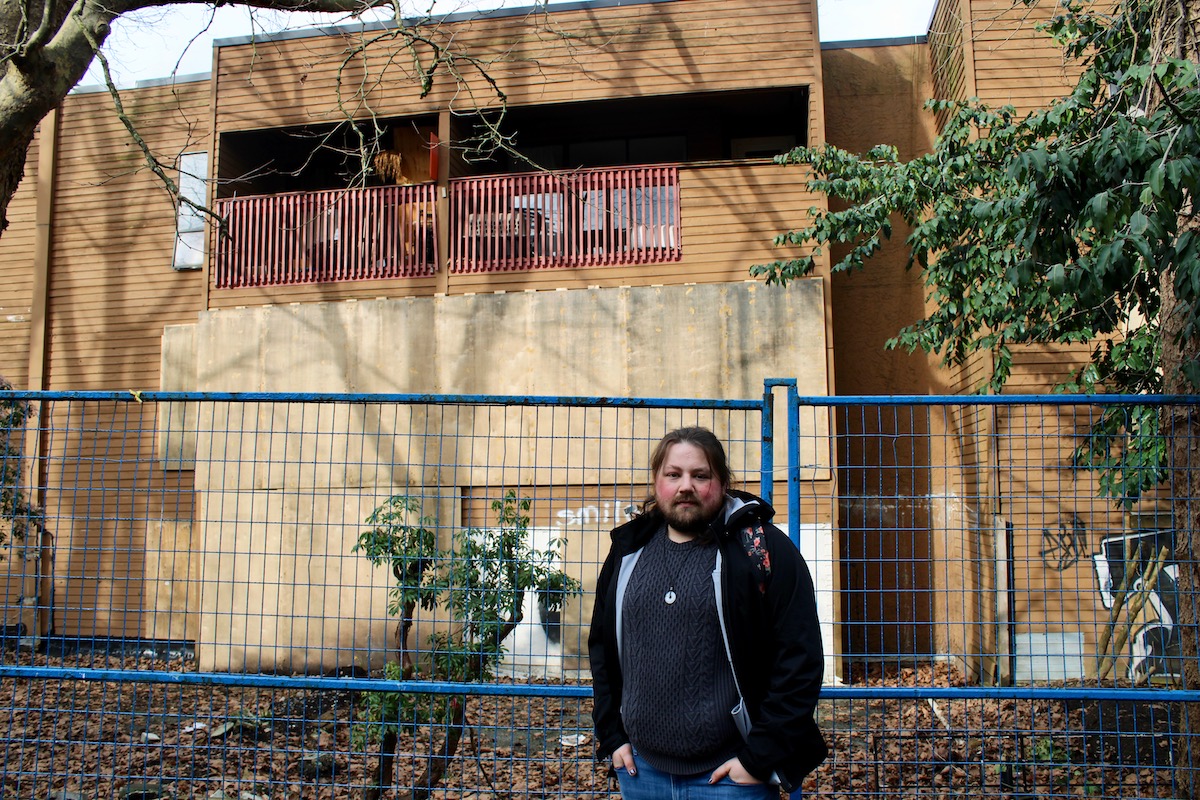
Nadine Nakagawa, a city councillor in New Westminster, suggested a provincial funding stream could be made available to help cities buy apartment buildings that aren’t being maintained properly. She also said cities should be able to take possession of buildings when they pose a serious risk to tenants.
“My gold standard would be for the city to take the housing temporarily,” Nakagawa said. “People’s lives are at risk.”
‘Everyone deserves a safe place to live’
Ethan Vlietstra is one of the tenants who lost his home when 414 E. 10th Ave. caught fire in summer 2023. The 24-year-old said he hadn’t planned to live in the rundown building forever: it was supposed to be a stepping stone to living permanently in Vancouver.
Eight months after the fire, Vlietstra hasn’t been able to find a new rental, and continues to live with friends. He said he’s been trying to make a case to the Residential Tenancy Branch that Ren and Yan owe tenants compensation for breaching the terms of their rental agreement. But he says that Ren hasn’t provided him a copy of his lease, which Vlietstra says he needs to continue with the RTB process. (Ren told The Tyee tenants are responsible for keeping a digital copy of their lease.)
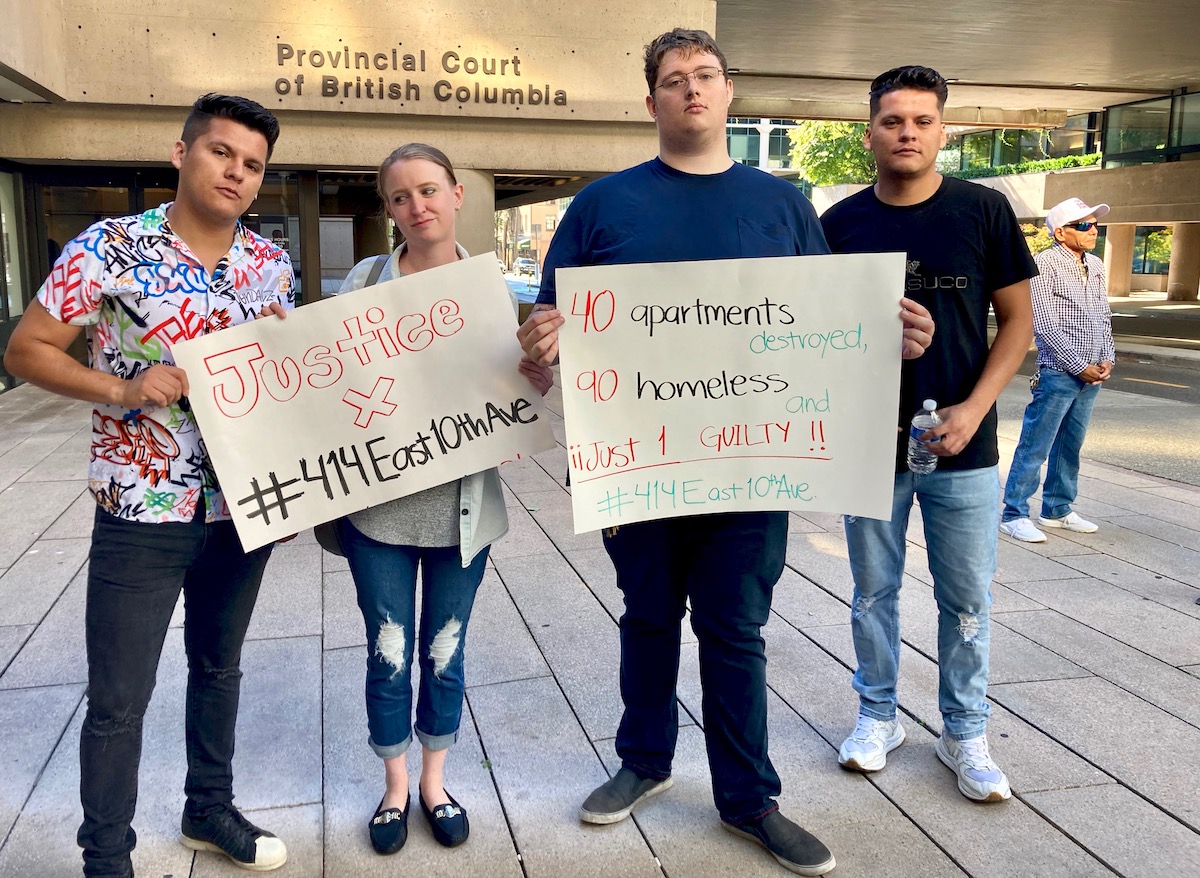
Vlietstra says the $4,500 Ren is required to pay seems “inconsequential” when compared with the steep price for the residents who lost their belongings as well as their affordable housing. Vlietstra and other tenants also say their building was not safe. At times, exterior doors were barred shut, there were frequent break-ins, and the building was infested with rats.
“Everyone deserves a safe place to live,” Vlietstra said. “I believe that is a basic human right: a safe place to live, that you can call home and not fear it’s going to burn down or people are going to break in.” ![]()
Read more: Health, Housing, Municipal Politics




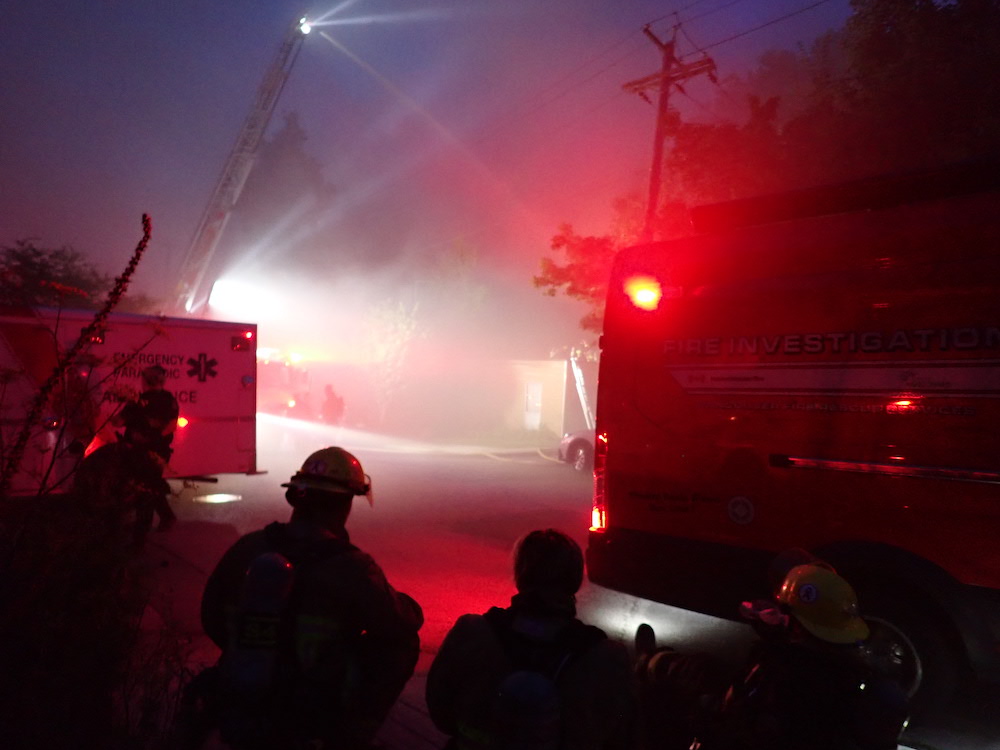












Tyee Commenting Guidelines
Comments that violate guidelines risk being deleted, and violations may result in a temporary or permanent user ban. Maintain the spirit of good conversation to stay in the discussion and be patient with moderators. Comments are reviewed regularly but not in real time.
Do:
Do not: